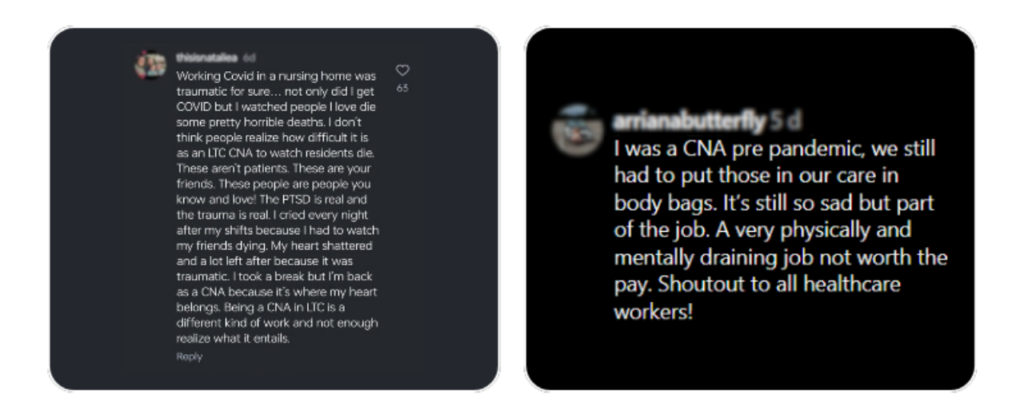Introduction: Understanding the Crisis Behind the Crisis
In the wake of the COVID-19 pandemic, a hidden crisis has emerged among our healthcare workers. Recent reports indicate that a staggering one-third of these essential workers are experiencing symptoms of Post-Traumatic Stress Disorder (PTSD). This alarming statistic underscores the urgent need to address the mental health crisis unfolding within our healthcare system.
The well-being of our healthcare workers directly impacts the quality of care patients receive and the overall stability of our healthcare infrastructure. By exploring their experiences, recognizing their struggles, and discussing potential solutions, we can work towards creating a more supportive and resilient healthcare environment.
Voices from the Frontlines: Social Media Insights
To truly understand the impact of the pandemic on healthcare workers, we need to hear their stories. Social media has become a powerful platform for these unsung heroes to share their experiences, providing raw and unfiltered insights into their daily struggles. Let’s take a look at some of the comments shared by healthcare workers on various social media platforms:


These heartfelt comments reveal the profound emotional toll and daily challenges faced by healthcare workers during the pandemic. From the trauma of witnessing numerous deaths to the frustration of inadequate protection, these testimonies paint a vivid picture of the crisis within our healthcare system.
The Long-Term Impact: PTSD and Emotional Trauma
According to NIH , sleep quality and symptoms of depression, anxiety, and stress among nurses have worsened during and after the COVID-19 outbreak. The key factors driving this decline were specifically the fear of becoming infected and the fear of infecting others.
As evident from these social media comments, the emotional scars left by the pandemic run deep. Many healthcare workers are grappling with PTSD and other mental health issues. The trauma they’ve experienced goes beyond the typical stresses of healthcare work, encompassing fears for their own safety, grief over lost patients, and the strain of working in crisis conditions for extended periods.
This widespread trauma requires immediate and long-term mental health support for healthcare workers. It’s crucial that we acknowledge the reality of their experiences and provide the necessary resources for healing and recovery.
Moving Forward: Bold Recommendations and Support for Healthcare Leaders
As we reflect on these powerful testimonies, it’s clear that we must take concrete steps to support our healthcare heroes:
1. Immediate Mental Health Support: Healthcare leaders must prioritize the mental well-being of their workers with comprehensive, immediate, and ongoing mental health services. Establish mandatory, on-site counseling and support groups tailored specifically to the experiences of healthcare staff. This isn’t optional—PTSD and trauma are debilitating, and early intervention is critical. Make these services confidential and stigma-free, ensuring that accessing help is as routine as clocking in for a shift.
2. Radical Shift in Working Conditions: It is time for healthcare leaders to overhaul the working environment. Implement enforced shift limits to prevent burnout and offer more flexible scheduling that prioritizes work-life balance. Adequate staffing is non-negotiable—invest in hiring and retention strategies that alleviate the crushing weight of understaffing. Provide ample protective gear without delays and compensate workers fairly for their physical and emotional labor. Leaders must shift from reactive to proactive workforce management, ensuring workers feel both protected and valued every day.
3. Public Accountability and Advocacy: Healthcare leaders need to spearhead nationwide awareness campaigns that educate the public on the real challenges healthcare workers face. The public must not only know but also feel the weight of this crisis. Mobilize media, community organizations, and educational institutions to build a movement of collective gratitude, empathy, and policy support for those on the frontlines. Every patient, family, and community member needs to stand behind healthcare workers in a visible, tangible way.
4. Systemic Overhaul for Sustainability: The pandemic exposed deep cracks in our healthcare infrastructure, and it’s time for leaders to fix the foundation. Advocate for policy changes that reduce chronic understaffing and increase funding for critical resources like mental health services and protective equipment. It’s time to rethink resource allocation and hold institutions accountable for creating environments that protect staff from preventable harm. We need a healthcare system built for long-term resilience, not one constantly on the brink of collapse.
5. Culture of Care and Empathy: Healthcare is more than just clinical expertise; it’s about care, both for patients and for those who deliver that care. Leaders must cultivate a workplace culture rooted in empathy, respect, and genuine concern for the well-being of their employees. Incorporate regular feedback loops, anonymous reporting, and mental wellness check-ins to keep a pulse on the emotional state of the workforce. Lead by example: leaders must advocate and model mental health practices within their own leadership teams, setting a standard of care that permeates the entire institution.
Conclusion: A Call for Collective Action
The testimonies from our healthcare workers are clear: they are not just asking for support; they are demanding it. This crisis requires bold leadership, decisive action, and immediate implementation of these solutions. Healthcare workers have shown us their strength and resilience in the most extreme conditions. Now it’s time for leaders in the healthcare industry to step up with the same courage, ensuring that those who care for us are, in turn, cared for.
This is not just a moral obligation—it’s essential to the survival and stability of our entire healthcare system. The time for passive acknowledgment is over. The time for action is now.
To every healthcare worker reading this: Your sacrifice has not gone unnoticed. Your strength inspires us. Your compassion heals us. And your resilience gives us hope for a better tomorrow.
Note: The content in this blog has been compiled based on the insights and experiences shared by healthcare workers on this account, KFF Health News. You can find the original post here, which provided the comments referenced throughout this blog.


